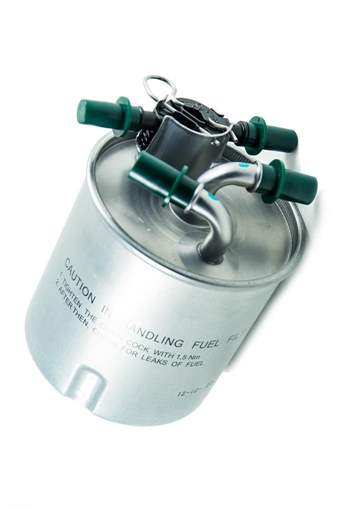What is a Fuel Filter?

The fuel filter is one of the most important components of a modern combustion engine. They ensure that only clean fuel is sent to the engine by removing dirt, debris and other contaminants. Modern fuel systems are very sensitive to contaminants in the fuel and even the smallest particle can cause expensive damage by eroding the fuel pump, valves or injectors. Fuel filters also maximise performance as clean fuel burns more efficiently.
It is recommended that the fuel filter is changed every 25,000 to 30,000 miles. However, this can vary depending on the car and the amount of driving.
Benefits of Regularly Changing Fuel Filters
1. Maximum Engine Performance
The most noticeable benefit of a clean fuel filter is engine performance. Modern high-precision fuel systems have very little tolerance to impurities in the fuel. These impurities can have a severe abrasive effect on the engine components and negatively affect engine performance as a result.
2. Clean Fuel Injectors
Fuel injectors spray a precise amount of fuel into the intake manifold. Impurities in the fuel can easily block or completely destroy one of these injectors. Replacing an fuel filter according to manufacturer’s guidelines can prevent this and prolong the life of such engine components. Furthermore, injectors are far more expensive to buy and replace then fuel filters.
3. Prevent Engine Misfires
An engine can misfire due to an incorrect fuel to air mixture, as mentioned above, a clogged or ineffective fuel filter can restrict the amount of fuel to the engine leading to an air-heavy mixture.
Symptoms of a Clogged Fuel Filter
When a fuel filter becomes clogged the fuel pump must work harder to pump sufficient fuel into the engine. A clogged fuel filter is more noticeable when the demand for fuel is higher than normal i.e. when driving up a hill or during acceleration. The fuel pump is put under increased pressure as it attempts to bring more fuel from a clogged and restrictive fuel filter.
The following symptoms are also good indicators:
1. Engine Will Not Start
If the fuel filter is completely blocked the necessary amount of fuel may not reach the engine for it to start.
2. Difficulty in Starting the Engine
As the clogged filter is limiting the amount of fuel to the engine it may take longer to start the engine than normal.
3. Engine Hesitation
The flow of fuel to the engine may become inconsistent resulting in misfires or some hesitation when trying to accelerate.
4. Stalling
The engine may stall and come to a complete stop if the amount of fuel getting to the engine is insufficient.
How to Change a Fuel Filter
The exact location of a fuel filter may vary it is generally located between the fuel tank and the fuel pump. The video below outlines how to change one as part of a service. (Forward to 7 minutes).
Click here to view video on YouTube.
https://www.youtube.com/watch?v=YmE2gFTaqmg
Visit our page and enter the registration number of the vehicle and select Go. If more than one fuel filter is shown there are a few things to look out for.
Date Limitation
Certain filters will only suit car models for specific ranges of time, this is called a date limitation. This will be clearly stated in the items description with
From Construction Year or
To Construction Year.
Dimensions
One of the best ways to ensure you purchase the correct fuel filter is to take measurements of the one currently in the vehicle and use this as a reference to the dimensions of the one listed on our website. It's important to note that different brands take measurements from different parts of the filter. The measurements they use are shown in the corresponding images of the filter.
Chassis Number
If the chassis number is shown in the details of the filter it is highly recommended to cross reference this to the chassis number of your vehicle.
Click here to start your search and if you have any questions use the comment section below and we will do our very best to help you. If you’re interested in learning more about car parts see our other articles
here.